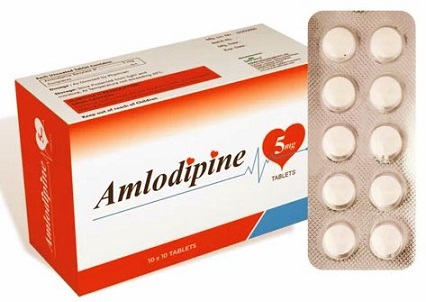Amlodipine, a high-blood pressure medication can cause gingival issues and tooth loss
Nikhil Prasad Fact checked by:Thailand Medical News Team Aug 22, 2024 8 months, 6 days, 1 hour, 46 minutes ago
Med News: Amlodipine and Gingival Enlargement
Recent research from the University of Kragujevac, Serbia, sheds light on a lesser-known side effect of amlodipine, a widely used medication for hypertension - gingival enlargement. This
Med News report delves into the findings of a comprehensive study aimed at understanding how amlodipine affects gingival tissues and the broader implications for patients' oral health and quality of life. The research, conducted by a team of experts from various departments within the university, provides novel insights into the molecular and clinical aspects of this condition.
 Amlodipine, a high-blood pressure medication can cause gingival issues and tooth loss
A Common Hypertension Drug with Uncommon Side Effects
Amlodipine, a high-blood pressure medication can cause gingival issues and tooth loss
A Common Hypertension Drug with Uncommon Side Effects
Amlodipine, a calcium channel blocker, is commonly prescribed to manage hypertension and other cardiovascular conditions. However, like many medications, it comes with potential side effects. One of the more troubling, albeit less commonly discussed, is gingival enlargement - a condition where the gums overgrow, leading to discomfort, difficulty in maintaining oral hygiene, and potential tooth loss.
The study aimed to identify the risk factors associated with amlodipine-induced gingival enlargement and to assess the quality of life of those affected. The researchers focused on the molecular changes in gingival tissues, particularly oxidative stress markers and the expression of key molecules that could be linked to this condition.
Understanding the Study: Key Methodologies
The study involved 32 patients undergoing amlodipine therapy, divided into groups based on the presence or absence of gingival enlargement. The researchers collected sociodemographic data, conducted clinical evaluations, and performed detailed analyses of gingival tissues. They used tools like RT-PCR and colorimetric assays to measure the expression levels of various molecules, including inflammatory cytokines, growth factors, and oxidative stress markers.
Interestingly, the study found no significant differences in sociodemographic characteristics, medication use, or disease duration between the groups. However, patients with gingival enlargement had higher systolic blood pressure and reported lower quality of life, as measured by the OHIP-14 scale.
Key Findings: Molecular Insights into Gingival Enlargement
One of the most significant findings of the study was the altered expression of certain cytokines and growth factors in the gingival tissues of patients with amlodipine-induced gingival enlargement. Notably, the expression levels of IL-6 and TNF-α were lower in patients taking amlodipine, regardless of whether they had gingival enlargement. This suggests that while amlodipine may have an anti-inflammatory effect, other factors contribute to the development of gingival enlargement.
Another critical finding was the elevated expression of TGF-β1 and CTGF in patients with gingival enlargement. These gr
owth factors are known to play a role in tissue fibrosis, which could explain the overgrowth of gingival tissue observed in these patients. The study also found significant differences in the expression of fibroblast growth factor 2 (FGF-2) and keratinocyte growth factor (KGF), both of which are involved in tissue repair and regeneration.
The Role of Oxidative Stress
Oxidative stress, a condition characterized by an imbalance between free radicals and antioxidants in the body, was another key area of investigation. The study found that patients with amlodipine-induced gingival enlargement had higher levels of superoxide dismutase (SOD) activity, indicating increased oxidative stress. This finding aligns with previous research suggesting that oxidative stress may contribute to drug-induced gingival enlargement.
Interestingly, the study also found that patients with gingival enlargement not taking amlodipine had even higher levels of malondialdehyde (MDA), a marker of oxidative damage. This suggests that while oxidative stress is a factor in gingival enlargement, it may play a different role depending on whether the condition is drug-induced or due to other factors, such as inflammation or infection.
Clinical Implications and Future Research
The findings of this study have important implications for clinicians managing patients on long-term amlodipine therapy. The identification of molecular markers and the role of oxidative stress in gingival enlargement could lead to new strategies for preventing and treating this condition. For instance, antioxidant therapies could be explored as a potential means to mitigate the oxidative stress associated with amlodipine-induced gingival enlargement.
Moreover, the study highlights the need for a multidisciplinary approach to patient care, integrating both oral health and cardiovascular management. Given the bidirectional relationship between oral health and systemic conditions, clinicians should be vigilant in monitoring the oral health of patients on amlodipine and consider regular assessments of oxidative stress markers and growth factor levels.
Conclusion
In conclusion, this study provides valuable insights into the complex mechanisms underlying amlodipine-induced gingival enlargement. By identifying key molecular changes and the role of oxidative stress, the research opens the door to new avenues for treatment and prevention. The findings underscore the importance of a holistic approach to healthcare, where both oral and systemic health are considered in tandem.
The study findings were published in the peer-reviewed journal: Pharmaceuticals.
https://www.mdpi.com/1424-8247/17/8/1075
For the latest on drug induced health issues and
Med News, keep on logging to Thailand Medical News.
Read Also:
https://www.thailandmedical.news/news/study-shockingly-reveals-that-catecholamines-and-catecholaminergic-drugs-can-interfere-with-human-testicular-functions
https://www.thailandmedical.news/news/u-s-fda-approves-neffy-the-first-nasal-epinephrine-spray-for-treating-severe-allergic-reactions
